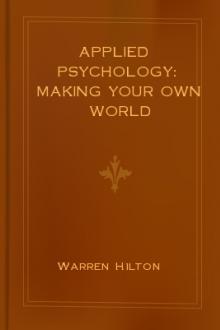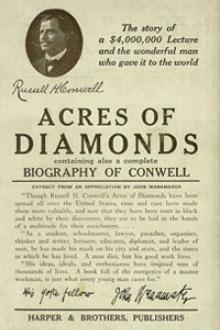Genre Philosophy. Page - 21

tion Process]
The other aspect of the Sense-Perceptive Process has to do with the mental interpretation of environment.
Both these aspects are distinctly practical.
You should know something of the weaknesses and deficiencies of the sense-perceptive organs, because all your efforts at influencing other men are directed at their organs of sense.
You should understand the relationship between your mind and your environment, since they are the two principal factors in your working life.
CHAPTER III
SENSORY ILLUSIONS AND SUGGESTIONS FOR THEIR USE
[Sidenote: Unreliability of Sense-Organs]
Figure 1 shows two lines of equal length, yet the vertical line will to most persons seem longer than the horizontal one.
[Illustration: FIG. 1.]
In Figure 2 the lines A and B are of the same length, yet the lower seems much longer.
[Illustration: FIG. 2.]
Those things lo

s: 5:24 And Enoch walked with God: and he was not; for God took him.
5:25 And Methuselah lived an hundred eighty and seven years, and begat Lamech.
5:26 And Methuselah lived after he begat Lamech seven hundred eighty and two years, and begat sons and daughters: 5:27 And all the days of Methuselah were nine hundred sixty and nine years: and he died.
5:28 And Lamech lived an hundred eighty and two years, and begat a son: 5:29 And he called his name Noah, saying, This same shall comfort us concerning our work and toil of our hands, because of the ground which the LORD hath cursed.
5:30 And Lamech lived after he begat Noah five hundred ninety and five years, and begat sons and daughters: 5:31 And all the days of Lamech were seven hundred seventy and seven years: and he died.
5:32 And Noah was five hundred years old: and Noah begat Shem, Ham, and Japheth.
6:1 And it came to pass, when men began to multiply on the face of the earth, and daughters were born unto them, 6:2 Th

p>The most important of these laws is the Law of Habit. In obedience to this law, the next idea to enter the mind will be the one that has been most frequently associated with the interesting part of the subject you are now thinking of.
The sight of a pile of manuscript on your desk ready for the printer, the thought of a printer, the word "printer," spoken or printed, calls to mind the particular printer with whom you have been dealing for some years.
The word "cocoa," the thought of a cup of cocoa, the mental picture of a cup of cocoa, may conjure with it not merely a steaming cup before the mind's eye and the flavor of the contents, but also a daintily clad figure in apron and cap bearing the brand of some well-known cocoa manufacturer.
If a typist or pianist has learned one system of fingering, it is almost impossible to change, because each letter, each note on the keyboard is associated with the idea of movement in a particular finger. Constant use has so welded th

suddenly changed and accomplished wonders. "I lost my opportunity," says one. That may be true, but by sheer force of will, we can find a way to bring us another opportunity. There is no truth in the saying that opportunity knocks at our door but once in a lifetime. The fact is, opportunity never seeks us; we must seek it. What usually turns out to be one man's opportunity, was another man's loss. In this day one man's brain is matched against another's. It is often the quickness of brain action that determines the result. One man thinks "I will do it," but while he procrastinates the other goes ahead and does the work. They both have the same opportunity. The one will complain of his lost chance. But it should teach him a lesson, and it will, if he is seeking the path that leads to success.
Many persons read good books, but say they do not get much good out of them. They do not realize that all any book or any lesson course can do is to awaken them to their possibilities; to stimulate them to use thei

dered me goodservice in the investigation of phobias, obsessions, illusions, and thelike, and which, under the name "psycho-analysis," had found acceptanceby a whole school of investigators. The manifold analogies of dream lifewith the most diverse conditions of psychical disease in the wakingstate have been rightly insisted upon by a number of medical observers.It seemed, therefore, a priori, hopeful to apply to the interpretationof dreams methods of investigation which had been tested inpsychopathological processes. Obsessions and those peculiar sensationsof haunting dread remain as strange to normal consciousness as dodreams to our waking consciousness; their origin is as unknown toconsciousness as is that of dreams. It was practical ends that impelledus, in these diseases, to fathom their origin and formation. Experiencehad shown us that a cure and a consequent mastery of the obsessing ideasdid result when once those thoughts, the connecting links between themorbid ideas and the re

facial muscles.
Constant repetition of the same kinds of thoughts or emotions finally makes permanent changes in that part of the body which is physiologically related to these mental processes.
The Evolution of the Jaw
¶ The jaw is a good illustration of this alliance between the mind and the body. Its muscles and bones are so closely allied to the pugnacity instinct center in the brain that the slightest thought of combat causes the jaw muscles to stiffen. Let the thought of any actual physical encounter go through your mind and your jaw bone will automatically move upward and outward.
After a lifetime of combat, whether by fists or words, the jaw sets permanently a little more upward and outward--a little more like that of the bulldog. It keeps to this combative mold, "because," says Mother Nature, the great efficiency expert, "if you are going to call on me constantly to stiffen that jaw I'll fix it so it will stay that way and save myself the trouble."
Inheritance

onderful world of ours. If this internalmolten mass came bursting out and cooled veryquickly it became granite; less quickly copper,less quickly silver, less quickly gold, and, aftergold, diamonds were made.
Said the old priest, ``A diamond is a congealeddrop of sunlight.'' Now that is literally scientificallytrue, that a diamond is an actual depositof carbon from the sun. The old priest told AliHafed that if he had one diamond the size ofhis thumb he could purchase the county, and ifhe had a mine of diamonds he could place hischildren upon thrones through the influence oftheir great wealth.
Ali Hafed heard all about diamonds, how muchthey were worth, and went to his bed that nighta poor man. He had not lost anything, but hewas poor because he was discontented, anddiscontented because he feared he was poor. Hesaid, ``I want a mine of diamonds,'' and he layawake all night.
Early in the morning he sought out the priest.I know by experience that a priest is very crosswhen awake

teness implies all give and little or no return, it is well to recall Coleridge's definition of a gentleman: "We feel the gentlemanly character present with us," he said, "whenever, under all circumstances of social intercourse, the trivial, not less than the important, through the whole detail of his manners and deportment, and with the ease of a habit, a person shows respect to others in such a way as at the same time implies, in his own feelings, and habitually, an assured anticipation of reciprocal respect from them to himself. In short, the gentlemanly character arises out of the feeling of equality acting as a habit, yet flexible to the varieties of rank, and modified without being disturbed or superseded by them." Definitions of a gentleman are numerous, and some of them famous; but we do not find such copiousness for choice in definitions of a lady. Perhaps it has been understood all along that the admirable and just characteristics of a gentleman should of necessity be those also of a lady, with the

from, and could not be without, the seed, so every act of a man springs from the hidden seeds of thought, and could not have appeared without them. This applies equally to those acts called "spontaneous" and "unpremeditated" as to those, which are deliberately executed.
Act is the blossom of thought, and joy and suffering are its fruits; thus does a man garner in the sweet and bitter fruitage of his own husbandry.
"Thought in the mind hath made us, What we are By thought was wrought and built. If a man's mind Hath evil thoughts, pain comes on him as comes The wheel the ox behind....
..If one endure In purity of thought, joy follows him As his own shadow--sure."
Man is a growth by law, and not a creation by artifice, and cause and effect is as absolute and undeviating in the hidden realm of thought as in the world of visible and material things. A noble and Godlike character is not a thing of favour or chance, but is the natural result of continued effort in right thinking, the eff

fe and children,perceiving it, began to cry after him to return; but the man puthis fingers in his ears, and ran on, crying, Life! life! eternallife! [Luke 14:26] So he looked not behind him, but fled towardsthe middle of the plain. [Gen. 19:17]
{19} The neighbours also came out to see him run [Jer. 20:10];and, as he ran, some mocked, others threatened, and some criedafter him to return; and, among those that did so, there were twothat resolved to fetch him back by force. The name of the one wasObstinate and the name of the other Pliable. Now, by this time,the man was got a good distance from them; but, however, they wereresolved to pursue him, which they did, and in a little time theyovertook him. Then said the man, Neighbours, wherefore are ye come?They said, To persuade you to go back with us. But he said, Thatcan by no means be; you dwell, said he, in the City of Destruction,the place also where I was born: I see it to be so; and, dyingthere, sooner or later, you will sink low